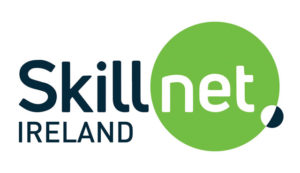E-learning driving business success

One of Ireland’s biggest strengths is its skilled and agile workforce. But as technology, new ways of working, climate change and global competition reshape the landscape, investing in this asset is vital. Embracing the revolution in online learning has opened up a world of opportunity for Irish businesses to develop their workforce.
“Unprecedented” is a word which was been frequently used to discuss the challenges Irish businesses have faced in the past 12 months. However, amidst the challenges, the past year has also yielded opportunity, particularly in the digitisation of learning and skills development.
Embracing online
When Covid-19 emerged, Skillnet Ireland immediately engaged with its industry partners and established a strategy to bolster businesses throughout the crisis and prepare them for recovery. By examining and re-designing existing support models, a range of targeted digital learning initiatives were created across all 73 Skillnet Business Networks, which could see businesses through the crisis and beyond, and support the Government response to the pandemic. Skillnet Ireland has also sought to leverage digital learning to go further, developing specialised virtual programmes including the new MentorsWork, Skills Connect and Climate Ready initiatives.
Digital learning has always been a key component of Skillnet Ireland’s model. However, like much of the world, the organisation saw its digital delivery rapidly accelerated in 2020 as skills demand from businesses soared and the classroom model became an impossibility.
Tracey Donnery, Executive Director Skillnet Ireland said: “Ensuring Irish businesses are successful is at the very heart of what we do. Business leaders and their teams were facing a completely new landscape and were seeking enterprise-led upskilling across many areas. Together with our networks, we made use of our expertise in digital skills development to create new programmes and support the workforce in an agile, responsive way.”
The pivoting to virtual delivery has enabled Skillnet Ireland, along with its industry partners, to support over 18,000 Irish businesses in 2020 and tackle rising skills demands including digital and specialised technology skills, e-commerce, financial management, healthcare supports, medtech, manufacturing, supply chain and logistics, managing remote working, and agri-food production.
Driving competitiveness
In 2019, Future Jobs Ireland outlined the need to encourage higher numbers of SME owners/managers to engage in upskilling to address the productivity gap between SMEs and larger companies. In response, in 2020 Skillnet Ireland created MentorsWork in partnership with the Small Firms Association. Focused on building SME owners and managers capacity to navigate the challenges presented by Covid-19 and future business recovery, the programme offers bespoke one-to-one virtual mentoring support to participants, allow them to sustain their business and plan for growth.
A strong appetite from businesses paired with flexible online delivery has been fundamental to the programme’s success according to Donnery: “Small businesses needed fast, focused support. Embracing digital learning allowed us to bring that support directly to businesses, pairing them with expert mentors for one-to-one guidance online and offering a suite of other virtual supports they can engage with on their own schedule for minimal disruption and maximum impact.”
MentorsWork is on track to support over 1,000 businesses by late 2021, with the online learning model delivering strong engagement levels for this traditionally hard to reach segment.
Meeting talent demand
Another digital learning initiative that has achieved notable success is Skills Connect, an initiative aimed at helping workers severely impacted by the pandemic to quickly reskill and secure new roles within their sector or undertake conversion courses to avail of opportunities in new sectors. The Skills Connect programmes have focused on sectors where there is employment potential and the demand for talent is high, including technology, agri-food, medtech, cyber security, wind energy, logistics, energy efficiency and digital marketing.

One example of the work underway is the Future in Tech programme from Technology Ireland ICT Skillnet. Supported by a host of technology companies, it offers seven certified Tech Skills Pathways to help non-tech jobseekers rapidly develop new digital skills and access job opportunities in the tech sector. Delivered fully online, the programme also incorporates online mentoring with more than 40 industry mentors supporting pods of four to six participants throughout. Having helped hundreds of trainees establish a new career within the technology sector to date, the programme demonstrates the potential of e-learning to develop healthy pipelines of new talent for Ireland’s economy.
Most recently, Skillnet Ireland has launched Climate Ready, a long-term initiative to equip Irish businesses with the skills to manage climate change. Developed to support Government’s Climate Action Plan and the Climate Action and Low Carbon Development Bill, it aims to equip businesses with the practical skills and insights they need to respond to challenges and opportunities presented by climate change. Virtual learning, via the Climate Ready Academy, will form a cornerstone of the offering. Aiming to support over 1,100 companies in its first year, the Climate Ready Academy already offers online programmes including a Sustainability Pass and the Energy Leaders Programme.
The digital learning horizon
Digital learning has proved its value, most especially for the business sector. Key to its future is the ongoing focus on innovation and quality assurance. One area Skillnet Ireland believes will pay dividends for workforce development is the adoption of digital badges and micro credentials, an emerging field that offers short lead-in times, flexibility in learning, and skill provision in new areas.
In 2021, Skillnet Ireland published A Micro-Credential Roadmap: Currency, Cohesion and Consistency, examining how micro-credentials can contribute to upskilling demands from industry. Conducted in partnership with the National Institute of Digital Learning (NIDL) and the Irish Institute of Digital Business in Dublin City University (DCU), and five Skillnet Business Networks, the research indicated a strong appetite from employers and several projects are currently underway to examine how the future workforce will adapt to new ways of learning including the use of micro-credentials and digital badges.
Looking ahead, Donnery says: “As the world of work changes, embracing new and creative approaches to workforce development and accreditation is vital. Ongoing development with new technologies including augmented and virtual reality will ensure continuing professional development becomes more accessible and engaging for each of us.”
As the economy rebuilds, the e-learning revolution for businesses has taken root. Offering ample benefits for businesses, it has the potential to reshape the face of workforce learning as more and more businesses discover and recognise its value.
For more information on Skillnet Ireland visit www.skillnetireland.ie






